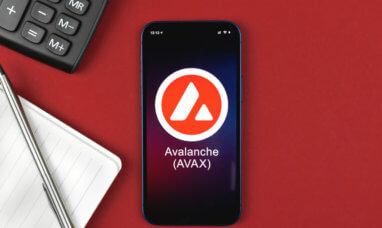One innovative way of making cryptocurrency work for you is by staking it. Staking is similar to mining, in that you help validate transactions on the blockchain. Staking digital coins that are built with proof-of-stake consensus protocol allows new coins to be added to secure the blockchain. This then financially rewards the validators. With Tezos, you can earn Tezos rewards.
Certain factors determine how much you can earn from staking your virtual currency. The type of coins, staking duration, staking platform, and amount you stake are some of the determinants that affect the reward you earn from staking.
What Is Tezos?
Tezos, whose ticker is XTZ, is a proof-of-stake cryptocurrency that can be staked to earn a reward. Tezos holders can stake their coins to participate in the governance process of the decentralized blockchain. Tezos is an open-source, self-amending, decentralized smart contract where apps can be built.
Tezos’ network is self-upgradable which eliminates the need for a hard fork. Furthermore, it uses the proof-of-stake protocol where new blocks are built through staking. Tezos’ native coin is known as Tez or Tezzie and holders who stake can participate in the decision-making process that will result in changes toward the protocol through voting.
Tezos was created in 2017 in Switzerland and was launched through one of the most profitable ICOs in history. Tezos ICO stats showed that it sold 80% in the ICO for 65000 BTC, while 10% was reserved for the founders and the remaining 10% for the development team. Tezos’ is unique in its self-evolution ability and also its strong security. The application is built with the Ocaml programming language.
Currently, XTZ to USD price is $4.84, while the XTZ BTC trading view is bullish and is predicted to maintain the momentum.
Staking XTZ
Staking XTZ is known as baking. Baking is the process of locking up a portion of XTZ and running a node that is kept updated and connected to the internet. Baking on the network is measured in rolls. Hence, to be a baker, you need a minimum of 8000 XTZ which is equal to 1 roll. Conversely, you can delegate your baking right to another person and be a delegator. In this case, you earn a reward without having to constantly update and connect to the network.
An endorser is also involved in the baking process. There are 32 endorsers for a block and each endorser is rewarded with 2 XTZ. Therefore, your total Tezos rewards depend on the block and endorsement rewards, block time, daily network rewards and total XTZ staked on the network at the time.
Forms of Staking
Independent Staking
Token holders with experience in staking can stake independently to be a baker. Bakers make more profit but must also set up and run baking software. Maintaining the baking software requires advanced knowledge and time to keep the software configured and running. Bakers have the right to vote on changes in the network. A baker is rewarded with 16 XTZ for a baked block.
Delegation Staking
If you do not have enough Tezos tokens or lack the time or know-how to be a baker, delegating your staking may be best for you. Tezos operates on a liquid proof-of-stake, which allows token holders who do not have 1 roll of XTZ to be a delegator and staker. In this case, delegators transfer their voting right to another node who is a baker. The upside to this is that you do not have to maintain any software and you’ll earn passive income.
More so, you are not transferring your coin to a validator. You still retain ownership of your coin and can opt-out any time after the initial holding period. However, delegators do not earn as much as bakers. Furthermore, it is important to do your due diligence before you choose a baker in order not to run into any problems. You can use tools like Baking Bad or My TezosBaker to learn more about a Baker before you choose them.
Staking XTZ as a Delegator
When you stake XTZ, you do not earn XTZ staking rewards immediately. In most cases, you’ll have to wait for a little over a month for your token to be liquid and you start earning interest. However, your yield will be paid every three days ( a cycle) after the initial holding period.
As a delegator, staking XTZ can take two forms; you can stake on a wallet or a custodial exchange.
Staking on a wallet like Ledger or Atomic wallet requires that you choose your validator and keep your private keys to yourself. Choosing a validator can be risky, although there are some wallets that will give you metrics to help you choose the right validator and earn XTZ staking rewards.
Binance, Coinbase, and Kraken are some of the centralized exchanges where you can stake your XTZ. While these custodial exchanges hold your private keys, you do not need to choose a validator. You can buy XTZ from these exchanges and stake it to earn ROI. Note that some custodial exchanges like Coinbase charge a specific percentage when you stake on the platform.
Where Can I Stake XTZ?
Ledger
Ledger is a hardware wallet that offers security against hacking. The wallet provides a secure means of staking your XTZ. You can either buy from this non-custodial exchange or move your Tezos to the Ledger account, but regardless you can store your token on the hardware. Furthermore, Ledger will provide you with a list of validators from which you canchoose. The wallet currently offers 4.36% ROI on staked XTZ.
Atomic Wallet
Similar to Ledger, Atomic wallet is a decentralized wallet where you delegate your XTZ to a baker selected from the list. However, you can also choose a custom baker that you trust even if they aren’t on the list. Atomic wallet offers a 7% yearly interest on staked XTZ. Since XTZ uses liquid proof-of-stake protocol, you, fortunately, do not have to unstake to move your coin. Unlike Ledger, Atomic does not provide a hardware wallet so it is not as secure.
Binance
Binance is a centralized exchange where you can stake your XTZ and earn passive income. Binance does not charge any fees when you stake your XTZ on the platform. You can stake a minimum of 50 XTZ and a maximum of 50,000 XTZ as an individual on Binance. Binance offers a 9.15% annual ROI when you stake your XTZ. However, your XTZ staking reward on Binance is variable.
Coinbase
Coinbase, unlike Binance, charges a specific percentage on XTZ staking. As a custodial exchange, Coinbase keeps your private keys but also acts as the validator for your coin. The result is that you do not need to choose a validator when you stake with Coinbase. You can earn up to 5% on your staked XTZ through Coinbase.
Final Thoughts
Tezos has a lot of potential and rewards for investors looking to earn passive income. You do not have to tie down your investment like other cryptocurrencies. It also uses a liquid proof-of-stake protocol, so you can sell your coin whenever you wish. Always consider the pros and cons of a coin before investing your time and money.
Featured Image: Twenty20








